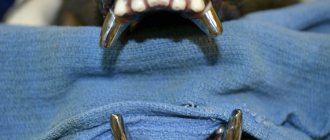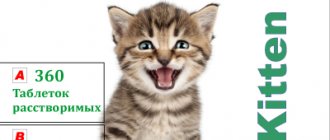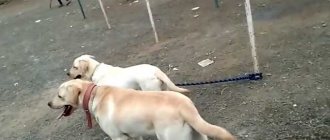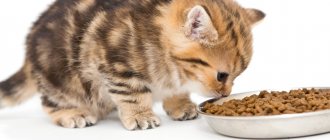Optimal age to move
Kittens are often purchased through online advertisements. Thoroughbreds are offered starting from 3 months of age. There are often offers to adopt 5-7 month old kittens. Pseudo-pedigree animals without documents of origin are sold as early as 3-4 weeks of age. Kittens from 3 weeks old are placed in “good hands” for free. Usually these are kittens from domestic and outdoor cats whose owners for some reason did not neuter.
At what age is it better to take a kitten home is an important question. Professional breeders claim that at 3-4 months the kitten is completely independent of the cat: it licks itself clean, knows the litter box, uses a scratching post following the example of its mother, eats and plays independently. The main thing is that the cat no longer feeds the kitten with her milk. The restructuring of the gastrointestinal tract was smooth and natural, the kitten switched to “adult” nutrition without stress. He is not afraid of people, plays with pleasure and cuddles up to them.
The baby, previously separated from his mother, suffers without her milk. It is difficult for him to digest industrial feed or natural food, which can lead to vomiting, diarrhea, and refusal to eat. He doesn't know how to lick himself or wash his paws. Because of this, his eyes may become sour and respiratory diseases often occur. Such a kitten is still poorly oriented in space and is not able to use the tray - it simply does not remember where it is. By relieving itself in different places, the kitten gets used to uncleanliness, and this habit is difficult to break. When a kitten has a need to sharpen its claws, it will satisfy it using the owner's sofa, wallpaper or doors, because there is no one to show it to the scratching post.
Note! It is optimal to adopt a kitten at 3-5 months: with vaccinations, treated for parasites and socialized.
At older ages, kittens are usually taken from breeders. These kittens attend exhibitions from 10 weeks, receive diplomas and are prepared for an exhibition career and breeding. The cost of an exhibition animal is much higher than the price of a kitten without diplomas and titles. A kitten that is unsuitable for exhibitions and breeding is usually already neutered at this age, and breeders sell it for a low price. A castrated purebred kitten is an excellent solution for those who want a pet from healthy producers that meets breed standards, but do not plan to breed.
Kitten at home
So, the touching moment has arrived! You brought the baby home. Place the carrier in the room and give the kitten time to independently walk through new and still frightening territory. You should not force him out of the carrier or box, and if you brought him in your arms, then lay something soft on the floor and gently and carefully lower him to the floor.
At first, you shouldn’t pay too much attention to its appearance. Give the kitten time to learn.
If there are children in the house, be sure to talk to them before the cat arrives in the house. It is necessary for them to understand that for now he is a fragile and vulnerable creature who is afraid. After all, he can even defend himself (hiss and scratch) if you start squeezing him, and all parties will not like this.
It is better to speak gently and kindly to the kitten, call it by name and stroke it when it finally decides to come out of hiding and explore the territory. Don't yell if he "does things" in the wrong place. He is still very young and does not understand where, how and why they need to be done. Over time, your patience and praise will help him get used to this difficult task.
So when is the best time to adopt a kitten?
You can bring a cat child into a new home when he is ready to live without his mother. Here are the signs of his independence:
- He was at least 3 months old.
- He no longer suckles the cat's milk.
- Knows the litter tray and scratching post.
- Licks and washes itself.
- He eats well, is well-fed, and his weight is within normal limits.
- He is not afraid of a person, shows curiosity and interest in him.
- He received his first vaccinations and developed immunity under familiar conditions.
Why can’t a kitten be given away early?
We have already discussed at what age it is preferable to adopt a kitten, but why exactly is it dangerous to adopt a very small pet? In a new place, a kitten of any age always experiences stress. The older the child, the faster and more painlessly he will get out of a stressful state, becoming captivated by a toy or new family members. The little kitten has problems with eating, sleeping (the mother always licks and feeds the kittens before bed), does not yet know how to play and, due to his age, is afraid of new people, animals, sounds and smells of the new home. Fears can take hold, and an already adult cat will flinch at the sound of a moving elevator or the creaking of a gate in the yard.
If the kitten is so young that it has not yet had its vaccinations, it is at risk of becoming ill due to stress. It is also possible to catch an infection in a new place, since he does not yet have his own immunity, and he no longer receives immune bodies from mother’s milk. Veterinarians do not recommend vaccination immediately upon arrival, since stress can provoke a sharp decrease in immunity, and the animal will die or become seriously ill from the administered vaccine.
Teething will additionally weaken the body. The baby will become restless, begin to meow pitifully, and refuse to eat. With the mother, this process will be much calmer.
In addition to the age-related nuances listed above, there is also this: if a kitten is taken away from a cat early, the cat will still continue to lactate. Unclaimed milk will stagnate in the mammary glands, which in the future can provoke mastitis, mastopathy and even tumors of the mammary glands.
If other kittens remain with her, they will in any case not be able to consume all the milk produced. And it’s really bad if a cat is deprived of all her kittens, because she can’t even get rid of part of the milk herself. Most likely, the owners will have to buy hormonal drugs for the cat to stop lactation.
The question of what age is best to adopt a kitten is something everyone decides for themselves. Recommendations to take a baby at 3-5 months do not guarantee that there will be no problems with him at all. Source: Flickr (Peter_Hasselbom)
How and what to feed your baby?
When the kitten is six weeks old, they begin to feed it seven times a day, with special dry food.
Before distributing the cubs to other people, the breeder must tell them how the cubs ate, since a sudden change from one food to another causes dyspepsia in kittens. At 6 weeks the animal is switched to dry kitten food. The number of feedings is 7 times a day and as they grow older, one feeding is eliminated every month. If the cat is purebred, a large selection is offered by Royal Canin, which produces food for Maine Coon, Persian, Siamese, and British babies. Or they are fed with special high-quality food with o, “Pronature”, “Origin”, “Akana”, “No”, “Go”, “Karnilov”, “Nutram”.
A small pet's diet should include boiled boneless fish and liver (no more than 1 meal every 2 weeks), raw frozen meat, cut into small pieces. Steamed meat products are strictly not recommended. Minced meat is undesirable because the baby will not learn to chew. Gluten-free porridges are healthy - rice, buckwheat, oats with the addition of meat ingredients and boiled vegetables. Raw yolk and low-fat cottage cheese can be 1 r. in 7 days. All products should be introduced gradually, in small portions, observing the body's reaction. After a year, an adult cat is given food with the Adult symbol if there are no health problems.
Kitten nutrition
Up to 4 weeks, the kitten eats only cat’s milk, which is the determining factor in the question “At what age can a kitten be adopted?” This is because consuming other foods can cause severe disturbances in the digestive system. At 4 to 6 weeks of age, kittens are offered specialized pates, but the main food is still milk. When your baby is between 6 and 10 weeks old, he learns to eat solid and wet foods, gradually replacing milk with them. But he still sleeps in the “nest” with his mother and drinks milk before going to bed. Complete refusal of milk occurs by the 12th week.
A cat's diet should include meat. Kittens can be offered boiled chopped rabbit, turkey, beef, and chicken. Dairy products are also important for kids - kefir, fermented baked milk, cottage cheese, low-fat cheese. Unleavened milk can cause diarrhea, but fermented milk will be beneficial. Fish and eggs (boiled) are given a couple of times a week.
If you feed a kitten with industrial food, then you need to choose only super premium food.
First week of life
Kittens are born without hearing or vision, with thin fur, brittle bones and poor thermoregulation, so they urgently need a mother to warm them. The first day after birth, the cat surrounds the offspring with its body and practically does not leave its permanent place. And when she makes short absences, the kittens try to huddle in one heap, closer to each other.
By the way, kittens have a developed sense of smell from birth, and therefore they can smell their mother from the first days of life. They are born weighing no more than 100 g and up to 10 cm long. Every day the kitten should gain 10–20 g.
At first, kittens sleep and eat almost all the time, cannot go to the toilet on their own and are not able to stand on their paws, moving around the cat by crawling. On the third day, the kittens lose their umbilical cord, and on the fifth day they develop hearing, although they cannot yet determine the source of the sound.
What to buy for a kitten
You need to prepare for the arrival of a kitten almost as carefully as for the discharge of a newborn from the hospital. Here is a list of necessary purchases:
- Bowls for food and water. There should be three bowls: for dry, wet food and water. If the kitten is on a natural diet, he will still need three bowls for different types of food.
- Tray. At first, the tray and its filler should be exactly the same as in the previous house. Only when the kitten is completely comfortable can you change the tray and filler.
- Scratching post. Sharpening nails will not only help reduce them or remove dead scales, but is also a way to mark territory. Therefore, even with trimmed claws, the cat will “sharpen” them on the scratching post, leaving the smell of the secretion of the interdigital glands.
- Claw cutter. Cats' nails need to be trimmed periodically, especially if they are prone to ingrown nails, growths, or peeling.
- Bed. The cat can sleep wherever he wants, but there must be a house where no one else sleeps and where he can hide.
- Carrying. It is necessary when traveling or visiting a veterinarian.
- Toys will not let the kitten get bored.
The question of what age is best to adopt a kitten is something everyone decides for themselves. Recommendations to take a baby at 3-5 months do not guarantee that there will be no problems with him at all. The deciding factor will be love and education, not the age at which the kitten was taken home.
Before the kitten appears in the house
You need to prepare thoroughly. First, remove from the “reach zone” all objects that can be chewed. A kitten can be interested in absolutely everything that can be reached with its paw or teeth. Chewed objects can be eaten, and then this will lead to surgical intervention!
So it’s better to prevent this right away. We also recommend removing decorative rugs and carpets from the floor during toilet training. Removed? Now go downstairs, squat down, and inspect everything again. Can't you eat anything from this angle? Great! This means the kitten’s home is safe! You can invite us to visit!











